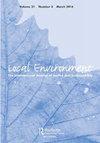获取、参与和蓝色经济与绿色经济的社会经济效益:系统的文献综述
IF 2.8
3区 环境科学与生态学
Q3 ENVIRONMENTAL STUDIES
引用次数: 0
摘要
本文章由计算机程序翻译,如有差异,请以英文原文为准。
Access, participation and socio-economic benefits of blue versus green economy: a systematic literature review
ABSTRACT There are implications to sustainable development from overconsumption of natural resources. Increasingly, economies are running out of resources to sustain or achieve desired growth rates and inclusive growth. As a result, momentum is building on exploring how the blue economy can be used as complimentary resource, particularly as a taping into it as an opportunity of ensuring that the marginalised groups in society are catered for. This is argued to address the ex-ante inequalities in other sectors of the economy, such as the green economy (land and resources on it), where participation by vulnerable groups like women and youth is limited owing to segregation policies of yesteryears, at least in former colonised countries like South Africa. The study used a systematic literature review, following the Preferred Reporting Items for Systematic reviews and Meta-Analyses for Protocols (PRISMA-P) approach to ascertain works on this topic and identify gaps that need to be addressed to adequately inform policy and practice. With regards to access and participation in the blue economy, most studies found that women do have access and participate in the blue economy, however, their participation is limited by barriers such lack of education and credit as well as patriarchal beliefs. Furthermore, women participation in both green and blue economies is determined by social norms, skills attainment, access to credit, age, technology. Most of the reviewed studies concluded that men derived more commercial benefits from green economy, while women derive more subsistence and recreational benefits from the blue economy.
求助全文
通过发布文献求助,成功后即可免费获取论文全文。
去求助
来源期刊

Local Environment
Environmental Science-Management, Monitoring, Policy and Law
CiteScore
4.10
自引率
4.20%
发文量
88
期刊介绍:
Local Environment: The International Journal of Justice and Sustainability is a refereed journal written by and for researchers, activists, non-governmental organisations, students, teachers, policy makers and practitioners. Our focus is specifically on sustainability planning, policy and politics in relation to theoretical, conceptual and empirical studies at the nexus of equity, justice and the local environment. It is an inclusive forum for diverse constituencies and perspectives to engage in a critical examination, evaluation and discussion of the environmental, social and economic policies, processes and strategies which will be needed in movement towards social justice and sustainability - "Just Sustainabilities" - at local, regional, national and global scales.
Please note that we only accept submissions that share our focus. Based on critical research and practical experience, we are particularly seeking submissions from nations and continents representing different levels of income and industrial development and from countries in transition in order to engage in mutual learning and understanding.
 求助内容:
求助内容: 应助结果提醒方式:
应助结果提醒方式:


